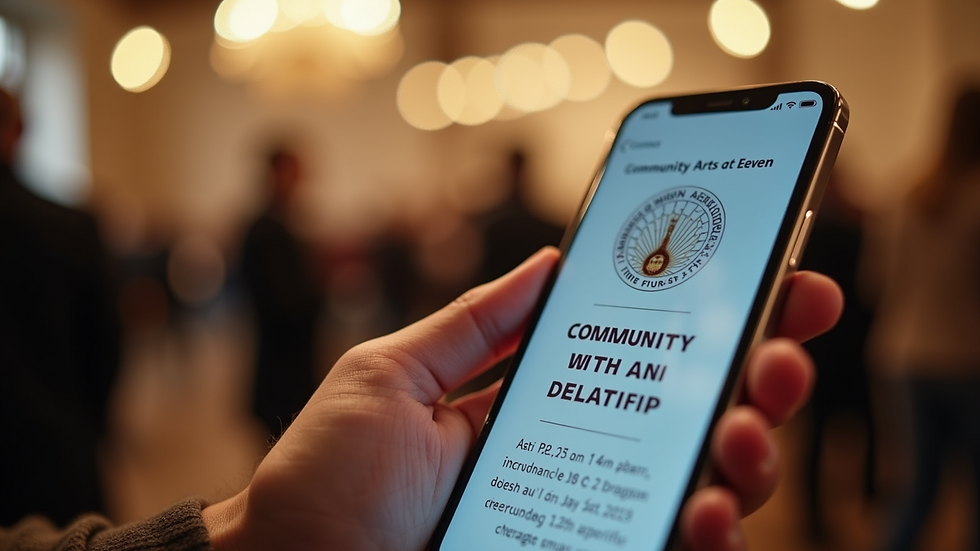Role and Impact of a Social Media Coordinator
- dale465
- Sep 22, 2025
- 4 min read
When we think about the magic behind the scenes of our favourite dance performances, theatre shows, or music events, we often picture the artists on stage. But there’s a whole world of creativity happening online too. That’s where social media roles come into play. These roles help bring the excitement of performing arts to life on platforms we use every day. They connect communities, share stories, and invite everyone to be part of the journey.
Let’s explore how these roles shape the way we experience arts today, and why they matter so much in making quality performing arts training accessible to all.
What Are Social Media Roles Arts and Why Do They Matter?
Social media roles cover a range of jobs focused on managing and promoting arts organisations through social media channels. These roles are essential because they help build a bridge between artists and audiences. Whether it’s a local dance school, a community theatre, or a music academy, social media professionals create content that sparks interest and encourages participation.
Imagine a vibrant Instagram post showcasing a dance routine, or a Facebook post inviting families to a singing workshop. These moments are crafted by people who understand both the art and the audience. They use storytelling, visuals, and engagement strategies to make the arts feel welcoming and exciting.
By sharing behind-the-scenes glimpses, success stories, and upcoming events, social media roles help break down barriers. They make it easier for people of all ages and backgrounds to discover opportunities and feel inspired to join in.
Creating captivating posts to link communities with the performing arts
How Social Media Roles Support Community Growth
One of the most rewarding parts of social media roles arts is the chance to nurture a sense of belonging. When we post about a local dance class or a theatre production, we’re not just sharing information. We’re inviting people to be part of something bigger.
Here are some ways these roles support community growth:
Highlighting diversity: Showcasing students and performers from different backgrounds encourages inclusivity.
Sharing success stories: Celebrating achievements motivates others to pursue their passions.
Providing updates: Keeping everyone informed about classes, workshops, and events helps people stay connected.
Encouraging interaction: Responding to comments and messages builds trust and engagement.
For example, a well-timed Instagram story featuring a young singer’s progress can inspire others to sign up for lessons. Or a Facebook post about an upcoming acting workshop might bring together new friends who share a love for drama.
By creating a welcoming online space, social media roles arts help remove the feeling of “I don’t belong here” and replace it with “I’m excited to be part of this.”

Inviting local communities to participate in performing arts events
Bringing Performing Arts to Life Online: Practical Tips
If you’re involved in social media roles arts or thinking about stepping into this world, here are some practical tips to make your work shine:
Know your audience: Understand who you’re speaking to. Are they parents, students, local residents? Tailor your content to their interests and needs.
Use visuals wisely: Photos and videos of rehearsals, performances, and classes create a real connection. Keep them bright, clear, and authentic.
Tell stories: Share journeys of students and teachers. Stories create emotional bonds and inspire participation.
Be consistent: Regular posting keeps your community engaged and informed.
Engage actively: Reply to comments, ask questions, and encourage sharing. Social media is a two-way street.
Highlight accessibility: Make sure your posts communicate that everyone is welcome, regardless of experience or background.
For example, a weekly “Meet the Teacher” post can introduce your team and make your organisation feel more approachable. Or a short video showing a dance class in action can spark curiosity and excitement.
By focusing on these simple strategies, social media roles arts can help performing arts organisations grow stronger and more inclusive.
Why We Value the Social Media Coordinator Role
At Dansworks, we truly appreciate the vital role a social media coordinator plays in our mission. This role is the heartbeat of our online presence, helping us share the joy of dance, acting, singing, and music with everyone in our local communities and beyond.
The social media coordinator brings warmth and personality to our digital platforms. They help us tell stories that resonate, celebrate every student’s progress, and invite new faces to join our classes. Their work ensures that quality performing arts training is not just a dream but a reachable goal for all.
We believe that through thoughtful and engaging social media, we can break down barriers and open doors. Together, we create a space where everyone feels welcome to explore their talents and grow personally.

Creating welcoming spaces both online and offline for performing arts
Embracing the Future of Social Media
Looking ahead, social media roles will continue to evolve as new platforms and technologies emerge. But the heart of the role remains the same - connecting people with the magic of performing arts.
By embracing creativity, kindness, and inclusivity, we can make sure that everyone has the chance to experience the joy of dance, acting, singing, and music. Whether you’re a student, a parent, or simply someone who loves the arts, social media roles arts help bring us all together.
Let’s keep celebrating stories, sharing moments, and building communities where dreams can flourish. After all, the arts are for everyone, and social media is one of the best ways to make that true.
Thank you for being part of this journey with us. Together, we can make the performing arts shine brighter than ever.

%20-%20Made%20with%20PosterMyWall.png)





Comments